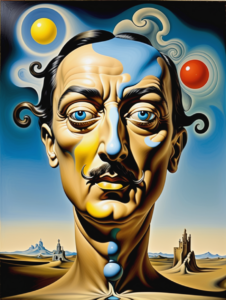Book Link 36 Introduction to States of Consciousness
<back next> — index
Learning Objectives
1. Describe the concept of states of consciousness, including waking, sleeping, and altered states.
2. Identify the different categories of consciousness and discuss their significance in psychology.
3. Examine the role of attention and awareness in distinguishing various states of consciousness.
Introduction
“States of consciousness” are different levels of awareness we have, which can change throughout the day. The waking state is when we are fully alert and aware of everything around us. This is the normal state we experience when we are engaged in our daily activities and interacting with our environment.
When we sleep, our awareness decreases, and there are different stages of sleep. One important stage is REM (Rapid Eye Movement) sleep, where dreaming happens. There’s also non-REM sleep, which includes various levels of brain activity. We may not be aware of our surroundings during this time.
 Altered states of consciousness (ASCs) occur when our mental state significantly differs from waking life. These can happen due to things like drugs, meditation, hypnosis, or even extreme stress.
Altered states of consciousness (ASCs) occur when our mental state significantly differs from waking life. These can happen due to things like drugs, meditation, hypnosis, or even extreme stress.
In these states, people might see things differently, think in unusual ways, or feel intense emotions that they wouldn’t normally feel when fully awake.
Modern Psychological Thinking of States of Consciousness
In modern psychology, consciousness is often categorized into several key states that help us understand how awareness and perception can change.
Attention & Awareness
These categories help psychologists study how different states of consciousness affect our thoughts, feelings, and behaviors, providing insight into the complex nature of human experience.
Attention and awareness are closely related to the different categories of consciousness in modern psychology. Each state of consciousness encompasses varying levels of attention and understanding, influencing how we experience the world. Attention and awareness are influence our perception, thoughts, and interactions with the world.
Altered States of Consciousness (ASCs):
ACS is any mental states that differ significantly from the normal waking state. ASCs can be induced by various factors, such as the use of psychoactive substances (like alcohol or drugs), meditation practices, or hypnosis. They can also occur in response to stress, trauma, or sensory deprivation, where the brain creates a different perception of reality.
ASCs can change how attention and awareness function. For instance, during meditation, attention can become highly focused or diffuse, leading to deeper relaxation and heightened awareness of one’s thoughts and feelings. Conversely, under the influence of drugs, attention may become fragmented, resulting in distorted perceptions and reduced awareness of reality. In hypnosis, individuals often experience heightened suggestibility and focused attention, leading to deep relaxation and altered perceptions.
Sleeping State:
During sleep, particularly in non-REM stages, awareness is significantly reduced, and attention to external stimuli is minimal. However, while the body is largely unresponsive in REM sleep, the brain is highly active, and we can still experience vivid dreams. In this case, our attention shifts inward, focusing on internal thoughts and images rather than the external world.
When we sleep, our level of awareness decreases significantly. This state includes various stages, primarily non-REM and REM sleep. Non-REM sleep has different levels, from light to deep sleep, while REM sleep is when most dreaming occurs. During this time, our brain processes information and restores itself.
Unconscious State:
In unconscious states, such as during a coma or under anesthesia, attention and awareness are completely absent. Individuals cannot process information or respond to external stimuli, highlighting how critical attention is for conscious experience.
This category includes states where awareness is not present, such as in a coma or anesthesia. Individuals in these states cannot respond to their environment, and no conscious thought or perception occurs.
Waking State:
This state is when Attention is at its highest. We are fully aware of our environment, can focus on specific tasks, and interact with others. Our ability to direct attention allows us to make decisions, process information, and respond effectively to stimuli. This heightened alertness is crucial for functioning effectively in daily life.
Waking State is the most familiar and normal state of consciousness where we are fully alert and aware of our thoughts, feelings, and surroundings. In this state, people can interact with the world, make decisions, and engage in conversations.
Attention and awareness are essential components that define how we experience each category of consciousness, influencing our perception, thoughts, and interactions with the world.
Summary
States of consciousness refer to the different levels of awareness we experience throughout the day. The waking state is when we are fully alert and aware of our thoughts and surroundings, allowing us to interact with the world and make decisions. When we sleep, our awareness decreases significantly and includes various stages, such as non-REM sleep, where the body rests and recovers, and REM sleep, where we dream. Altered states of consciousness (ASCs) occur when our mental state changes greatly from the waking state due to factors like meditation, drugs, or extreme stress. In these states, our perceptions and emotions can be very different from what we experience when we are awake.
In modern psychology, consciousness is broken down into categories to help us understand how our awareness can change. During the waking state, our attention is at its highest, allowing us to focus and interact with others. In contrast, while we sleep, especially during non-REM stages, our awareness and attention to the outside world are reduced. ASCs can shift our focus in unusual ways, either enhancing our awareness during meditation or making it difficult to think clearly when under the influence of drugs. Finally, in unconscious states like a coma or anesthesia, we lose all awareness and cannot respond to what’s happening around us, showing how important attention is to our conscious experiences.
Keywords: Consciousness, Waking State, Altered States, Awareness, Unconscious State